Penland Textiles Program
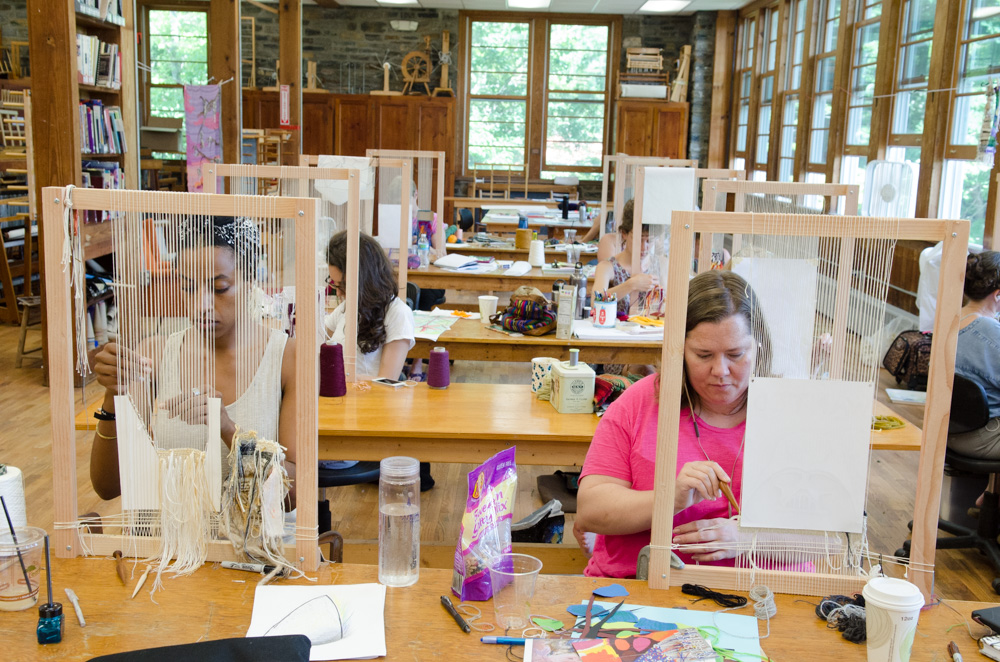
The Penland textiles program offers beginning to advanced workshops in traditional and contemporary methods. Two studios provide space and specialty equipment for the exploration of concept and technique in textiles. The scope of each workshop is determined by the instructor with input from our program director and support from our programming staff. Our versatile facility and high caliber artist/educators allow us to provide relevant programming in topics from natural dying and weaving to mixed media sculpture and everything in between. We strive for a balance of technical and aesthetic content and value all cultural and historical perspectives. We offer workshops that inspire and challenge students from curious beginners to accomplished professionals. Our programming is current in spirit and respectful of craft traditions.
The studios are very flexible, but are particularly well equipped for weaving (including cloth, tapestry, and experimental/off-loom structures), dyeing, printing, basketry, felting, knitting, and sewing (including patterning and construction for garments or accessories, quilting, embroidery, and alternative approaches to stitching). The range of workshop topics includes but is not limited to natural dying, double weave, shibori, screenprinting, contemporary quilt design, sculptural basket forms, digital jacquard, millinery, beading, shoemaking, and soft sculpture. Materials and techniques are combined in a myriad of ways, and instructors often ground technical exploration with conversations about historic and/or current context, design, or idea generation. Recent instructors include: Bhakti Ziek, Tommye McClure Scanlin, Wayne Wichern, Saberah Malik, Catharine Ellis, Joy Boutrop, Chrisitina Roberts, Kyoung Ae Cho, Natalie Chanin, Amy Putansu, Susan Iverson, Charllotte Kwon, Akemi Nakano Cohn, Tim Eads, Rachel Meginnes, María Dávila, Eduardo Portillo, Amara Hark, and Lisa Sorrell, among many others.
Our workshops take place in two well-equipped, well-maintained, and safe textiles studios designed to accommodate diverse content and working styles. There are work/print tables or looms for each student, two well-ventilated dye kitchens, a screenprinting spray booth, washer and dryer, and a sewing room.
Note: Our textiles studios are second- and third-floor walk-up studios accessible by a stair lift.
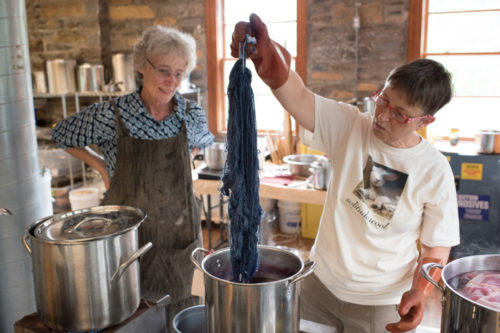
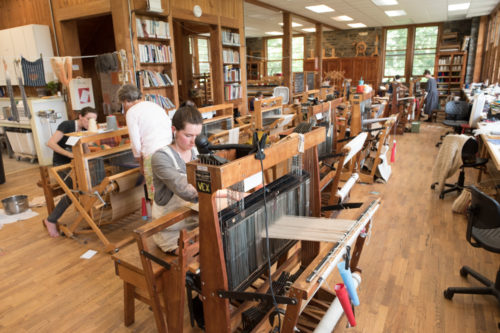
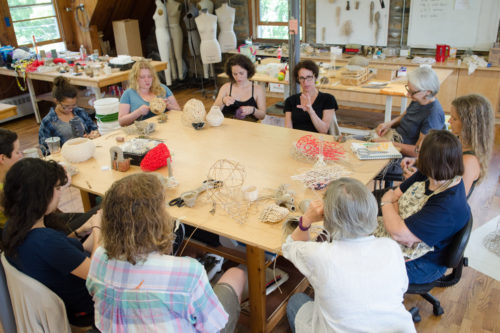
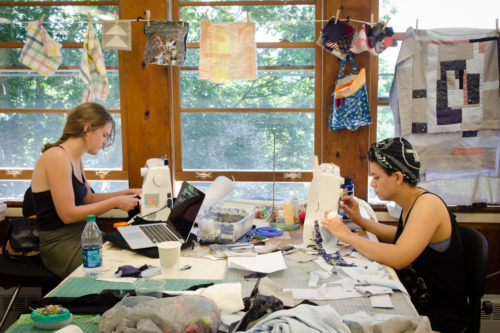
Lower Textiles Studio
This list of equipment is intended to give you an idea about what the weaving studio is like. Keep in mind that, although this equipment is available in the studio, if something is not necessary for your class, it may not be prepared or available for use. The equipment used by your class will be determined by your instructor and will be appropriate to the techniques covered in your class. This is a general description of equipment and may change before your session.
Equipment
General Studio Area Looms
12 Schacht Mighty Wolf 36″/8H
3 Macomber Ad-A-Harness 24″/8H
1 Macomber Ad-A-Harness 32″/12H
2 Macomber Ad-A-Harness 32″/8H
2 Macomber Ad-A-Harness 40″/8H
1 Macomber Ad-A-Harness 48″/8H
1 Macomber Ad-A-Harness 56″/8H
1 Louët Kombo 40 8H table loom
Other Equipment
12 weaving tool kits for rental use (see below for more information)
3 drum carding machines
7 pairs of hand carders/carding paddles
Loom benches
12 warping boards
2 warping reels
2 Schacht 8-cone cone holders
Reeds, dent sizes: 4-20, various widths
Raddles
Lease sticks
7 electric bobbin winders: 4 double-ended, 1 single-ended
4 manual Schacht bobbin winders
4 manual ball winders
4 wooden umbrella swifts
6 metal umbrella swifts
3 Schacht GOKO metal swifts
3 Leclerc metal skeinwinders
2 Schacht 20-spool spool racks
17 drop spindles
Stainless steel digital scale
Task lamps with clamps
1 yardage counters
Box fans
Tool cabinet with a limited selection of miscellaneous hand tools: wrenches, pliers, hammers, mallets, screwdrivers, hand drill, staple guns, handsaws, jewelers’ saws, pruning saws, hedge shears, and extension cords
Tables, chairs, and stools
12 Janome Schoolmate sewing machines
12 sewing kits for rental use
Dye Kitchen
3 propane gas burners
3 portable induction burners
2 sinks
1 microwave
1 small refrigerator
Various dye kitchen equipment, including stainless steel dye pots and basins, buckets, pots and pans, measuring spoons and cups, spatulas, whisks, scales, thermometers, towels, plastic drop cloths, etc.
Students are responsible for any servicing and/or replacement needed for any of the studio equipment used during their class.
Supplies and Materials
Shared class supplies (specific material items requested by your instructor) can make up part of a studio fee. You will be notified in advance with the amount of the estimated studio fee for your class in your student information packet.
If your class requires hazardous materials, they will need to be disposed of properly. A hazardous waste disposal fee will be charged in addition to the studio fee.
In order to limit the hazardous waste generated in the studios, Penland cannot allow students to bring toxic materials onto the campus UNLESS they are listed on the student materials list. Any materials that you bring with you that are not listed on the student materials list MUST be NON-TOXIC. All materials brought onto the Penland campus must be in its proprietary (original) packaging.
Please refer to the student materials list for specifics about materials needed for the class. In order to reduce waste, paper towels are NOT provided by the studio, so please plan to bring 3-4 cotton towels for your personal use. If you feel the need to use paper towels, please bring enough rolls for the duration of your session. Paper towels are available for purchase in the school store as well.
Resale
The studio stocks a selection of yarn based on instructors’ requests. Yarn is sold through the weaving studio by the studio assistant during scheduled times. Please refer to the student materials list for specifics on materials needed for your class.
Toolkits
12 weaving tool kits are available to rent during your class. The weaving tool kit rental fee is $5. The weaving tool kit includes 2 boat shuttles (1 small, 1 large), 5 bobbins for each shuttle, 1 reed hook, 1 heddle hook, 2 stick shuttles, 1 measuring tape, 1 pair of basic scissors, 1 pair of snips, tapestry needles, and 2 small pick-up sticks.
The student is responsible for any damaged and/or lost items and will be required to pay for the cost of repair and/or replacement of the damaged/lost equipment.
Classroom
The Weaving/Lower Textiles Studio is located on the 2nd floor of the Lily Loom House; it is accessible by a staircase with a stair lift. The overhead lights are full-spectrum fluorescent. A washer and dryer are located on the third floor and are to be shared with the Surface Design Studio. The building is heated but not air-conditioned. You may want to bring a small, portable fan with you.
Smoking is not permitted in or near the building; cigarette breaks involve a flight of stairs and a trip outside to the designated smoking area – an uncovered picnic table.
The third floor has one shared bathroom and the ground floor of Lily Loom House has two bathrooms available. (There is no bathroom on the second floor).
Student Workspace
The Weaving Studio is a communal workspace. Students are provided a loom with a bench, chair or stool, a table, and a clamp-on desk lamp with full-spectrum bulb.
Students are welcome to bring favorite personal hand tools for use in the studio.
Upper Textiles Studio
he list of equipment below is intended to give you an idea about what the Surface Design Studio is like. Keep in mind that, although this equipment is available in the studio, if something is not necessary for your class, it may not be prepared or available for use. The equipment used by your class will be determined by your instructor and will be appropriate to the techniques covered in your class.
This is a general description of equipment and may change before your session.
Equipment
8 communal padded print tables
1 demonstration padded print table
Chairs and stools
LG washer/dryer
3 portable garment steamers
12 sewing kits for rental use (see below for more information)
2 Bernina 800 DL sergers (shared with the weaving studio)
12 Bernina model 1008 (mechanical) sewing machines, assorted feet including free-motion and cording (You are welcome to bring your own sewing machine.)
Assorted wooden hat forms
Full body dress forms, sizes 6, 10, 14, and 16
Lawson Expo-Light vacuum exposure unit for exposing silk screens
A.W.T. Dry-It drying cabinet for drying photo emulsion coated silk screens
Misc. scoop coaters and squeegees for silk screens
Large sink/spray booth for cleaning silk screens
Washout Booth with Filter
6 wooden, table-sized T-squares for silk screen registration
Irons and ironing boards
1 thermofax machine/3M transparency maker
1 Mighty Press clam press, 16” x 20” t-shirt heat press
1 Mac PC
1 Epson scanner
1 Epson printer, 17” width
1 white, dry-erase board with markers and eraser
Hair dryers
Manual and electric staple guns
Fans
2 Q-snap floor quilting frames, 28” x 39”
18″ Quilter’s Wonder hoop with stand
Assorted embroidery and quilting hoops
2 Artisan 1797 walking foot industrial sewing machines
2 Artisan 5110 post bed industrial sewing machines
Dye Kitchen
6 propane gas burners with exhaust fans above
3 portable induction burners
2 vertical steamers with stainless steel cores
2 horizontal steamers
Stainless steel double sink
Hooded dye mixing booth
Small refrigerator
Assorted balances and scales
2 blenders
2 hand mixers
PVC pipes for arashi/pole-wrap shibori
Various dye kitchen equipment including stainless steel dye pots and basins, buckets, pots and pans, measuring spoons and cups, spatulas, whisks, scales, thermometers, towels, plastic drop cloths, etc.
Students are responsible for any servicing and/or replacement needed for any of the studio equipment used during their class.
Supplies and Materials
Shared class supplies (specific material items requested by your instructor) can make up part of a studio fee. You will be notified in advance with the amount of the estimated studio fee for your class in your student information packet.
If your class requires hazardous materials, they will need to be disposed of properly. A hazardous waste disposal fee will be charged in addition to the studio fee.
In order to limit the hazardous waste generated in the studios, Penland cannot allow students to bring toxic materials onto the campus UNLESS they are listed on the student materials list. Any materials that you bring with you that are not listed on the student materials list MUST be NON-TOXIC. All materials brought onto the Penland campus must be in its proprietary (original) packaging. Please refer to the student materials list for specifics about materials needed for the class. In order to reduce waste, paper towels are NOT provided by the studio, so please plan to bring 3-4 cotton towels for your personal use. If you feel the need to use paper towels, please bring enough rolls for the duration of your session. Paper towels are available for purchase in the school store as well.
Resale
The studio stocks a selection of fabrics based on instructors’ requests. Fabric is sold through the surface design studio by the studio assistant during scheduled times. Please refer to the student materials list for specifics on materials needed for your class.
Toolkits
12 sewing kits are available to borrow for a rental fee. The rental fee for a sewing kit is $10. The sewing kit includes a French curve, set of hand-sewing needles, needle threader, a pin cushion, basic scissors, seam gauge, seam ripper, straight pins, measuring tape, tailor’s chalk and pencils, thimble, colored tracing paper, water-soluble pen, serrated tracing wheel, tracking wheel, and rotary cutter.
The student is responsible for any damaged and/or lost items and will be required to pay for the cost of repair and/or replacement of the damaged/lost equipment.
Classroom
The Surface Design/Upper Textile Studio is located on the third floor of the Lily Loom House; it is accessible by a staircase with a stair lift. The overhead lights are full-spectrum fluorescent. The building is heated but is not air-conditioned. You may want to bring a small, portable fan with you.
Smoking is not permitted in or near the building; cigarette breaks involve two flights of stairs and a trip outside to a designated smoking area – an uncovered picnic table. A shared bathroom is located on this floor, and there are two shared bathrooms on the first floor of Lily Loom House.
Student Workspace
The Surface Design Studio is a communal workspace, with students sharing large print tables with each other. The tables stand about 30”, and adjustable chairs are provided to accommodate you. Naugahyde dropcloths are provided to use to protect the print tables. (There will be a charge for print tables damaged due to carelessness).
Students are welcome to bring favorite personal hand tools for use in the studio.
Storage
Lockable storage space is not available for student use in the textiles studios. Lockers are available to rent elsewhere on campus for a refundable fee. Locks are available at the school store.
Safety Information
The studio coordinator gives a mandatory safety walk-through at the beginning of every class. The walk-through informs you on how to safely operate equipment and work in the studio space, as well as what the safety procedures are in case of an emergency.
A first aid kit, 3 fire extinguishers, a fire blanket, an emergency eyewash station, and a Material Safety Data Sheet (MSDS) binder are provided in the studio.
A hazardous waste station is also in the studio for disposal of spent solvents/chemicals and solvent rags. A spill kit is provided in case of small spills of caustic, flammable, or corrosive materials.
North Carolina Health regulations do not permit Penland School to provide dust masks, respirators, gloves, aprons, and other safety equipment for shared use. Please refer to the student materials list for specifics about safety equipment needed for the class. Some items may be available for purchase at the school store.
Alcohol consumption is not permitted in the studios. Working in the studios under the influence of alcohol is not permitted. The use of illegal drugs is prohibited on the Penland campus.
Shared Studio Equipment
Besides shared equipment, it is important to note that the Weaving/Lower Textile Studio is a shared space.
Shared air space/music: Each class should discuss the playing of music and reach a consensus on the time of day, the volume, and the type of music to be played. Tolerance and consideration are expected from everyone.
If you wish to use equipment in other studios during your session, you must contact the studio coordinator of that particular studio first. If permission is granted, then you must work with the instructor, studio assistant, and studio coordinator of that studio to arrange access. They will determine if the desired usage is compatible with their class’ activities and if you are able to work safely and independently with the equipment.
Clean-Up
The whole class is asked to participate in weekly clean-up sessions and a FINAL clean up at the end of the class.
Session Schedule
Each session starts with an all-school meeting Sunday evening at 5pm followed by dinner in the Pines. Classes start Sunday at 8:30pm. Classes end and studio clean-up takes place the day before your session ends. The last day of each session is reserved for farewells and an all-school exhibition of work created during your time at Penland.
Everyone must participate in studio clean-up; if you must leave early, please ask the studio assistant to assign you clean-up tasks you can accomplish before your departure.
If you have questions, contact:
Studio Coordinator: Danielle Lasker
Voicemail: 828-765-2359 x 1323
E-mail Address: textile@penland.org


